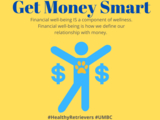Financial Literacy Month
April is Financial Literacy Month. Let’s take this opportunity to reflect on our financial well-being. But first, let’s acknowledge that the COVID-19 pandemic may have impacted our physical, social, and financial lives in some way. The pandemic has
- Increased unemployment in nearly every state.
Highlighted the impact of socioeconomic inequality, particularly for women and people of color.
Changed the way college students learn. From connecting with study partners online to the infamous WebEx meetings, students and educators have been resilient through all of the past year’s challenges.
With the promise of vaccines available to all adults 16 years of age and older, the nation is grappling with the prospect of an economic recovery. And yes, before you ask— financial well-being IS a component of wellness. We must challenge ourselves to broaden our scope of what financial well-being means to us. Financial well-being is more than how much money you have in your bank account. Financial well-being is how we define our relationship with money.
In honor of Financial Literacy Month, here are a few ways to make your relationship with money healthier.
- Take inventory of your personal finances.Write down how much money you earn each month. Next, write down your fixed and variable expenses. Fixed expenses reoccur each month. This includes housing, tuition or student loans, and car payments. An emergency fund, which most experts agree should cover 3-6 months of expenses, is also a fixed expense. Variable expenses change each month, depending on your daily spending habits. Variable expenses include eating out, personal services (e.g. hair and nail care), clothing, and entertainment.
- Create a budget. Now that you know how much money you earn and spend each month, you can create a budget that reflects your financial goals. Write out how much money you will spend for fixed and variable expenses each month. If you desire to grow your emergency fund, try reducing your variable expenses. Likewise, if you would like to move into a new place, start investing, or even give to a charity, you may be able to do this by saving more of your variable expenses. Just remember, your budget is more than a suggestion. You should aim to stick to your budget as much as possible if you want to achieve your goals.
- Ditch the financial guilt. Whether we spent too much money eating out or missed a scholarship application deadline, we have all made a poor financial decision at some point in our lives. Your past relationship with money, which may include judgment, shame, and guilt for some, does not have to predict your financial future. If you purchased an item outside of your budget, it may not be too late to return or sell it. Regardless of your previous spending habits, you can always adopt new habits that prepare you for a healthier future.
- Overcome FOMO. Everyone has felt the fear of missing out, or FOMO. From your friends planning a Spring Break trip for 2022 to seeing someone in a seemingly expensive new outfit on Instagram, we are wired to want to join others in their social media highlight reels. Nonetheless, comparing your financial journey with others is a sign of an unhealthy relationship with money. Your budget, financial goals, and income, will likely look different from your peers. It’s okay to skip an activity if it hinders you from sticking to your budget. To overcome the FOMO, try replacing this activity with an enjoyable activity that fits your budget.
- Seek sound financial advice. Let’s face it, not all of us come from a family or culture in which money is openly discussed. Finances remain a taboo topic for most college students. We can combat unhealthy stigmas about money by seeking professional financial advice. Fortunately for students, UMBC’s Financial Smarts offers virtual tools for managing money at no cost. Check out the program’s CashCourse, CASHCoach, and CashClips at https://financialsmarts.umbc.edu/programs/.
National Financial Literacy Month is both a celebration and a call to action. Maintaining a healthy relationship with money can be a daunting task. But, by taking small steps each day towards financial wellness, you can create a healthier tomorrow.
Posted: April 30, 2021, 10:46 AM
